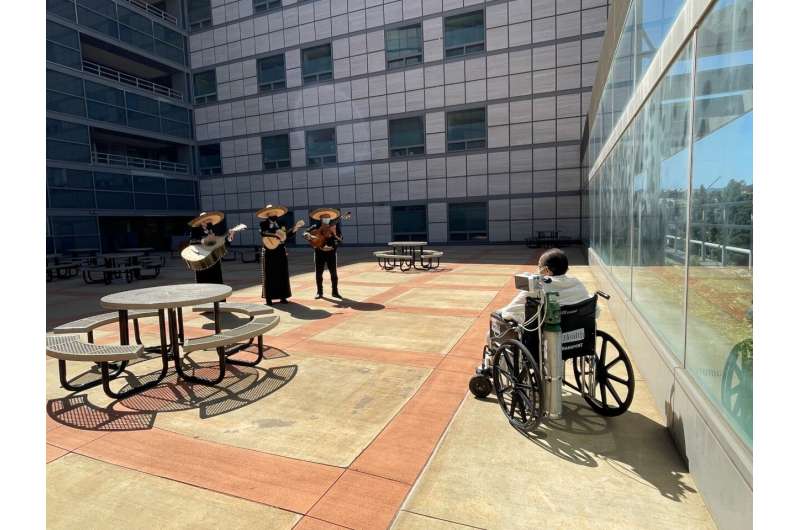
A research in regards to the initiative, revealed within the journal Crucial Care Explorations, is the primary to point out empirically {that a} palliative care program might be tailored—and even expanded—throughout the pandemic. It additionally might function a case research for bettering end-of-life care throughout an period when visiting restrictions and an infection management have launched extraordinary new challenges for well being care suppliers.
Researchers analyzed the quantity and sorts of needs granted, earlier than and throughout the pandemic, by UCLA Well being’s 3 Needs Program, which fulfills small however significant requests from dying sufferers and their households. The research adopted 523 sufferers in six grownup intensive care models at two places, the Ronald Reagan UCLA Medical Heart and the UCLA Santa Monica Medical Heart.
By this system, which was launched in 2017, UCLA Well being employees have offered sufferers and their households with mementos together with keychains capturing the dying affected person’s fingerprints, framed prints of electrocardiograms and sculptures of entwined arms of family members. They’ve organized out of doors weddings and private music performances, and commissioned volunteers to create work that honor sufferers’ pursuits and hobbies.
The analysis discovered that, regardless of the challenges of the pandemic, a mean of 24.8 sufferers monthly participated in this system throughout the interval from March 1, 2020 by March 31, 2021, up from 17.6 sufferers monthly throughout the identical interval a yr earlier. Sufferers who died on the UCLA medical facilities throughout the pandemic had been much less doubtless than those that died previous to the pandemic to have household with them and, the research discovered, extra prone to have their postmortem needs fulfilled for his or her households.
“The findings had been each stunning and heartwarming,” mentioned Dr. Thanh Neville, medical director of the three Needs Program and lead creator of the research. “Although sufferers who died within the ICU throughout the pandemic had been much less prone to have household by the bedside, the variety of sufferers who participated within the 3 Needs Program throughout the pandemic really elevated in comparison with earlier than the pandemic.”
That means that UCLA Well being employees, already devoted to their sufferers’ well-being, took benefit of many alternatives to step up much more for sufferers and their households throughout the pandemic, Neville mentioned.
“Having a cherished one within the ICU with COVID-19 actually put extra stress on households, however caring for these sufferers additionally took an emotional toll on ICU employees,” Neville mentioned. “Taking part in 3 Needs gave well being care employees the chance to do one thing constructive for these households throughout a tragic state of affairs—the employees had been grateful to have a technique to do extra than simply bear witness.”
By this system, sufferers’ requests are fulfilled not by palliative care specialists, however by frontline nurses, licensed vocational nurses and docs within the intensive care unit.
“You would possibly assume that creating the mementos can be an unwelcome added duty throughout this busy time, however all of us selected to do it, needed to do it, supplied to do it,” mentioned Kristen Hjelmhaug, an intensive care nurse at Ronald Reagan UCLA Medical Heart who has been lively within the 3 Needs Program since its inception. “We might ask households, ‘Would a memento be comforting to you?’ and, because it seems, all of the households we requested had been wanting to have one thing that was visible and bodily. These are small issues, however crucial emotionally.”
This system’s worth grew to become much more apparent throughout the pandemic, when non secular care suppliers and social employees had been solely in a position to go to with sufferers on-line, and whereas hospital insurance policies governing sufferers’ visits with relations have been in flux. At some factors throughout the research interval, no visits in any respect had been allowed, whereas at others, relations had been permitted solely to go to when sufferers had been close to loss of life after which, just for an hour at a time.
To maintain this system going throughout the pandemic, hospital employees modified the way in which they fulfilled sufferers’ requests. Serenades passed off outdoor to permit for bodily distancing, and fingerprints used to make mementos had been sterilized first with UV irradiation, for instance.
The three Needs Program was tailored from an analogous initiative at a Canadian hospital; Neville mentioned it might be replicated for different medical facilities, including that the necessity for such packages will proceed to develop.
“This end-of-life program makes a distinction to our sufferers and households,” she mentioned. “In a manner, it grants the want of suppliers within the ICU as nicely—the want to present the most effective household-centered care doable for each individual, which generally means serving to folks depart this life with dignity and kindness.”
- Monday12:00 AM - 12:00 AM
- Tuesday12:00 AM - 12:00 AM
- Wednesday12:00 AM - 12:00 AM
- Thursday12:00 AM - 12:00 AM
- Friday12:00 AM - 12:00 AM
- Saturday12:00 AM - 12:00 AM
- Sunday12:00 AM - 12:00 AM












